Reflective Essay on Following Best Practice Standards in Aged Care
VerifiedAdded on 2023/05/29
|9
|1883
|341
AI Summary
This reflective essay explores the experience of following best practice standards in aged care, with a focus on infection control. The essay discusses feelings, values, and beliefs, as well as the impact of personal values on professional performance. The essay also includes an analysis of the importance of compliance with practice standards and an action plan for continuous professional development.
Contribute Materials
Your contribution can guide someone’s learning journey. Share your
documents today.
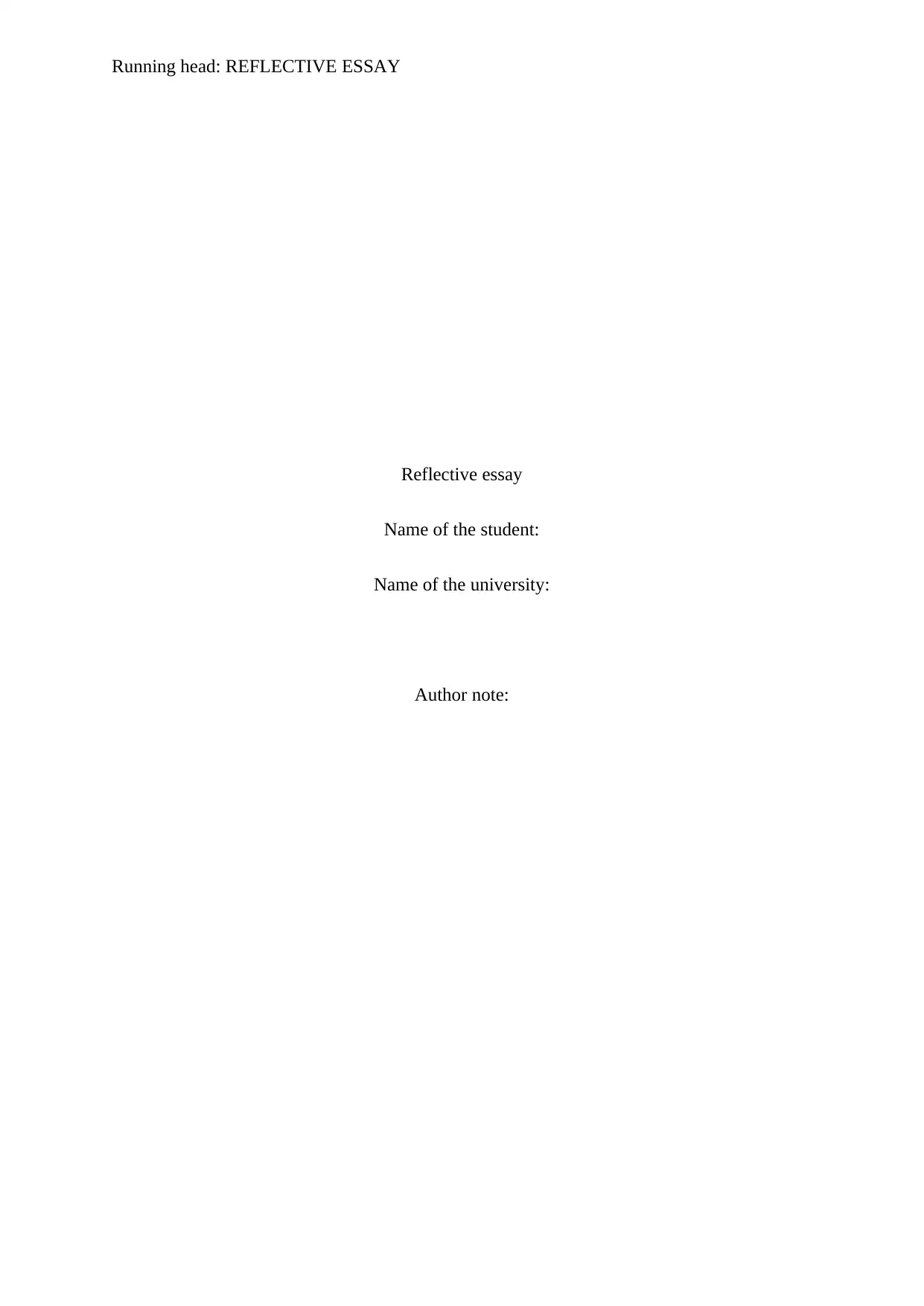
Running head: REFLECTIVE ESSAY
Reflective essay
Name of the student:
Name of the university:
Author note:
Reflective essay
Name of the student:
Name of the university:
Author note:
Secure Best Marks with AI Grader
Need help grading? Try our AI Grader for instant feedback on your assignments.
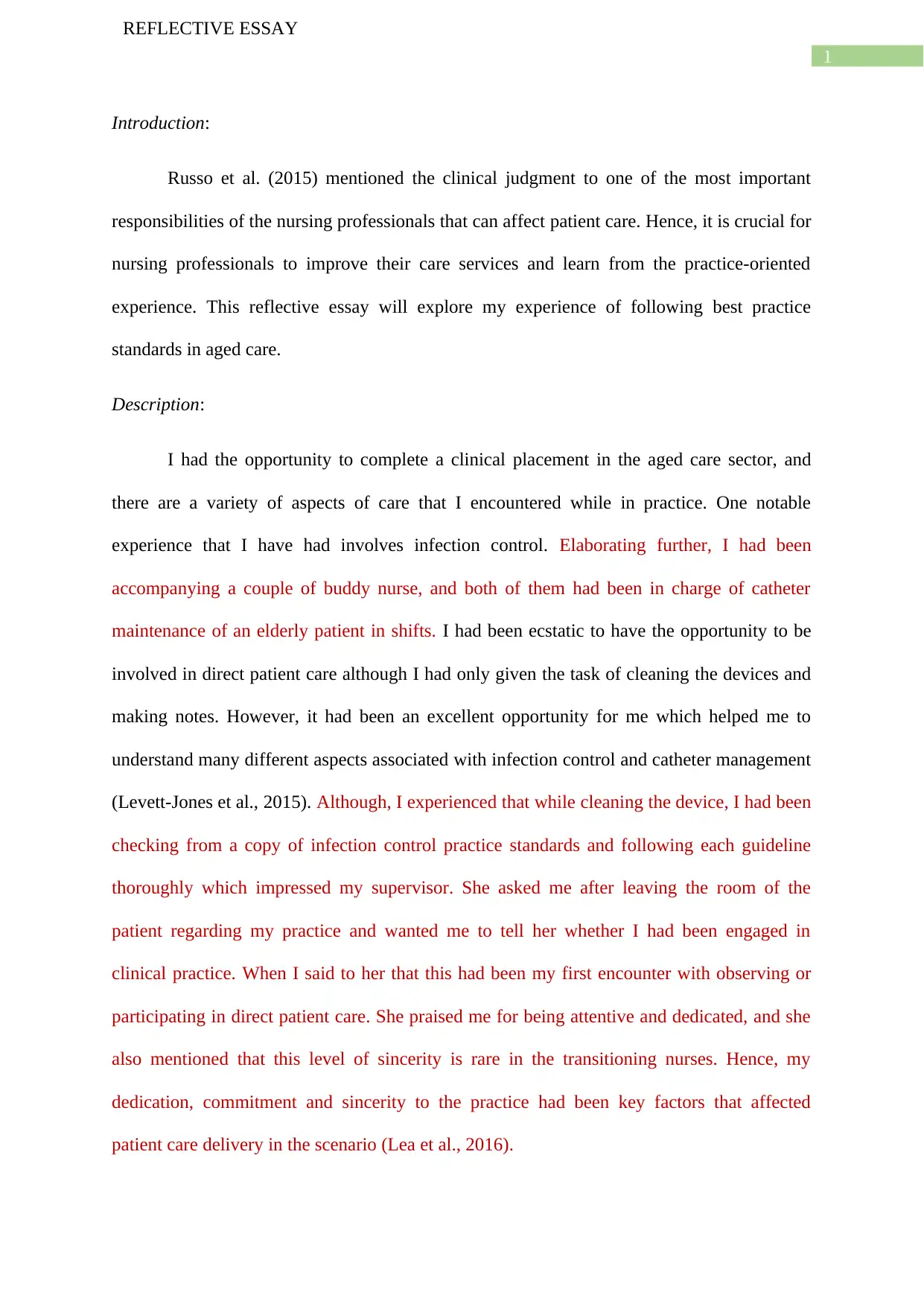
1
REFLECTIVE ESSAY
Introduction:
Russo et al. (2015) mentioned the clinical judgment to one of the most important
responsibilities of the nursing professionals that can affect patient care. Hence, it is crucial for
nursing professionals to improve their care services and learn from the practice-oriented
experience. This reflective essay will explore my experience of following best practice
standards in aged care.
Description:
I had the opportunity to complete a clinical placement in the aged care sector, and
there are a variety of aspects of care that I encountered while in practice. One notable
experience that I have had involves infection control. Elaborating further, I had been
accompanying a couple of buddy nurse, and both of them had been in charge of catheter
maintenance of an elderly patient in shifts. I had been ecstatic to have the opportunity to be
involved in direct patient care although I had only given the task of cleaning the devices and
making notes. However, it had been an excellent opportunity for me which helped me to
understand many different aspects associated with infection control and catheter management
(Levett-Jones et al., 2015). Although, I experienced that while cleaning the device, I had been
checking from a copy of infection control practice standards and following each guideline
thoroughly which impressed my supervisor. She asked me after leaving the room of the
patient regarding my practice and wanted me to tell her whether I had been engaged in
clinical practice. When I said to her that this had been my first encounter with observing or
participating in direct patient care. She praised me for being attentive and dedicated, and she
also mentioned that this level of sincerity is rare in the transitioning nurses. Hence, my
dedication, commitment and sincerity to the practice had been key factors that affected
patient care delivery in the scenario (Lea et al., 2016).
REFLECTIVE ESSAY
Introduction:
Russo et al. (2015) mentioned the clinical judgment to one of the most important
responsibilities of the nursing professionals that can affect patient care. Hence, it is crucial for
nursing professionals to improve their care services and learn from the practice-oriented
experience. This reflective essay will explore my experience of following best practice
standards in aged care.
Description:
I had the opportunity to complete a clinical placement in the aged care sector, and
there are a variety of aspects of care that I encountered while in practice. One notable
experience that I have had involves infection control. Elaborating further, I had been
accompanying a couple of buddy nurse, and both of them had been in charge of catheter
maintenance of an elderly patient in shifts. I had been ecstatic to have the opportunity to be
involved in direct patient care although I had only given the task of cleaning the devices and
making notes. However, it had been an excellent opportunity for me which helped me to
understand many different aspects associated with infection control and catheter management
(Levett-Jones et al., 2015). Although, I experienced that while cleaning the device, I had been
checking from a copy of infection control practice standards and following each guideline
thoroughly which impressed my supervisor. She asked me after leaving the room of the
patient regarding my practice and wanted me to tell her whether I had been engaged in
clinical practice. When I said to her that this had been my first encounter with observing or
participating in direct patient care. She praised me for being attentive and dedicated, and she
also mentioned that this level of sincerity is rare in the transitioning nurses. Hence, my
dedication, commitment and sincerity to the practice had been key factors that affected
patient care delivery in the scenario (Lea et al., 2016).
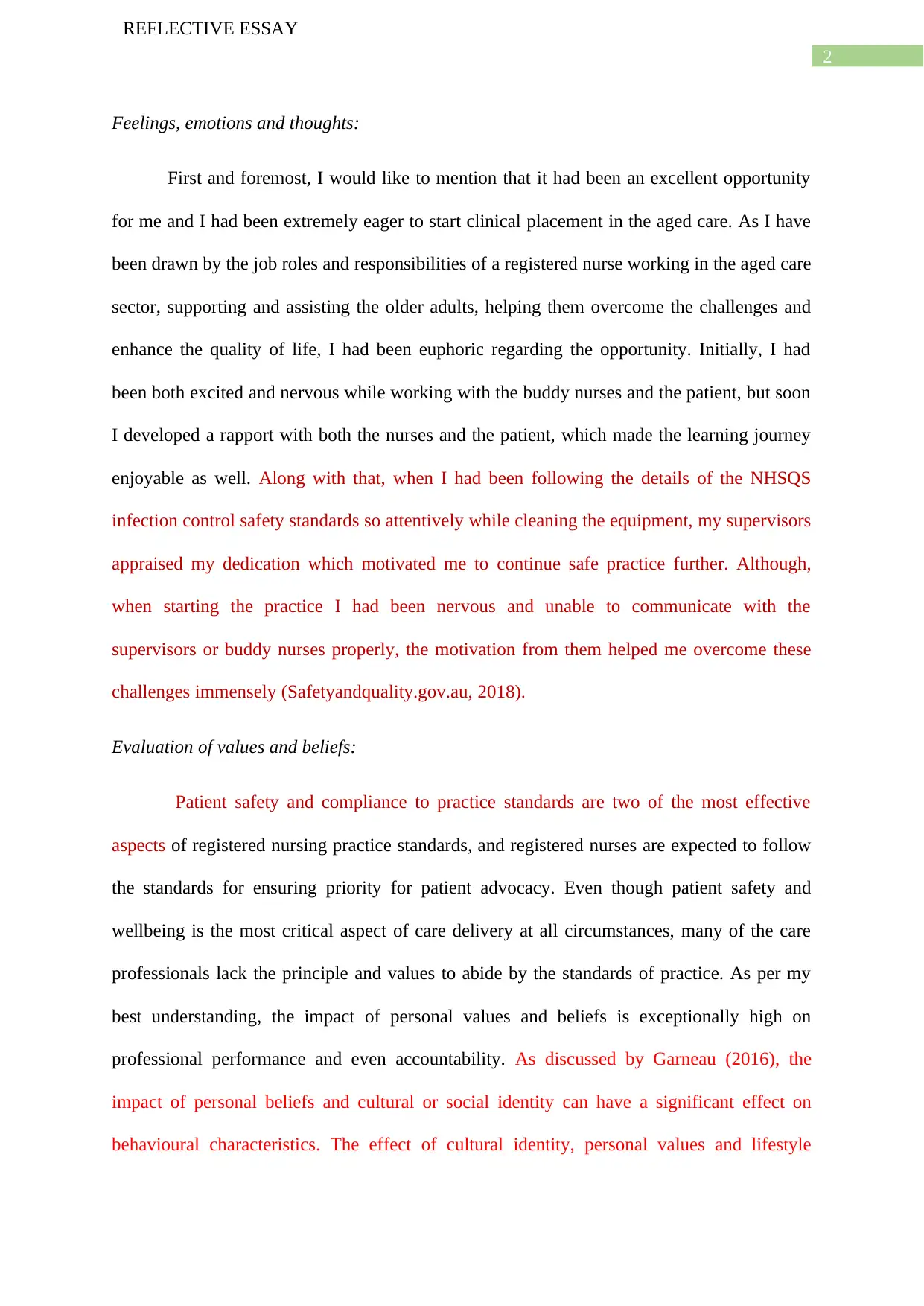
2
REFLECTIVE ESSAY
Feelings, emotions and thoughts:
First and foremost, I would like to mention that it had been an excellent opportunity
for me and I had been extremely eager to start clinical placement in the aged care. As I have
been drawn by the job roles and responsibilities of a registered nurse working in the aged care
sector, supporting and assisting the older adults, helping them overcome the challenges and
enhance the quality of life, I had been euphoric regarding the opportunity. Initially, I had
been both excited and nervous while working with the buddy nurses and the patient, but soon
I developed a rapport with both the nurses and the patient, which made the learning journey
enjoyable as well. Along with that, when I had been following the details of the NHSQS
infection control safety standards so attentively while cleaning the equipment, my supervisors
appraised my dedication which motivated me to continue safe practice further. Although,
when starting the practice I had been nervous and unable to communicate with the
supervisors or buddy nurses properly, the motivation from them helped me overcome these
challenges immensely (Safetyandquality.gov.au, 2018).
Evaluation of values and beliefs:
Patient safety and compliance to practice standards are two of the most effective
aspects of registered nursing practice standards, and registered nurses are expected to follow
the standards for ensuring priority for patient advocacy. Even though patient safety and
wellbeing is the most critical aspect of care delivery at all circumstances, many of the care
professionals lack the principle and values to abide by the standards of practice. As per my
best understanding, the impact of personal values and beliefs is exceptionally high on
professional performance and even accountability. As discussed by Garneau (2016), the
impact of personal beliefs and cultural or social identity can have a significant effect on
behavioural characteristics. The effect of cultural identity, personal values and lifestyle
REFLECTIVE ESSAY
Feelings, emotions and thoughts:
First and foremost, I would like to mention that it had been an excellent opportunity
for me and I had been extremely eager to start clinical placement in the aged care. As I have
been drawn by the job roles and responsibilities of a registered nurse working in the aged care
sector, supporting and assisting the older adults, helping them overcome the challenges and
enhance the quality of life, I had been euphoric regarding the opportunity. Initially, I had
been both excited and nervous while working with the buddy nurses and the patient, but soon
I developed a rapport with both the nurses and the patient, which made the learning journey
enjoyable as well. Along with that, when I had been following the details of the NHSQS
infection control safety standards so attentively while cleaning the equipment, my supervisors
appraised my dedication which motivated me to continue safe practice further. Although,
when starting the practice I had been nervous and unable to communicate with the
supervisors or buddy nurses properly, the motivation from them helped me overcome these
challenges immensely (Safetyandquality.gov.au, 2018).
Evaluation of values and beliefs:
Patient safety and compliance to practice standards are two of the most effective
aspects of registered nursing practice standards, and registered nurses are expected to follow
the standards for ensuring priority for patient advocacy. Even though patient safety and
wellbeing is the most critical aspect of care delivery at all circumstances, many of the care
professionals lack the principle and values to abide by the standards of practice. As per my
best understanding, the impact of personal values and beliefs is exceptionally high on
professional performance and even accountability. As discussed by Garneau (2016), the
impact of personal beliefs and cultural or social identity can have a significant effect on
behavioural characteristics. The effect of cultural identity, personal values and lifestyle
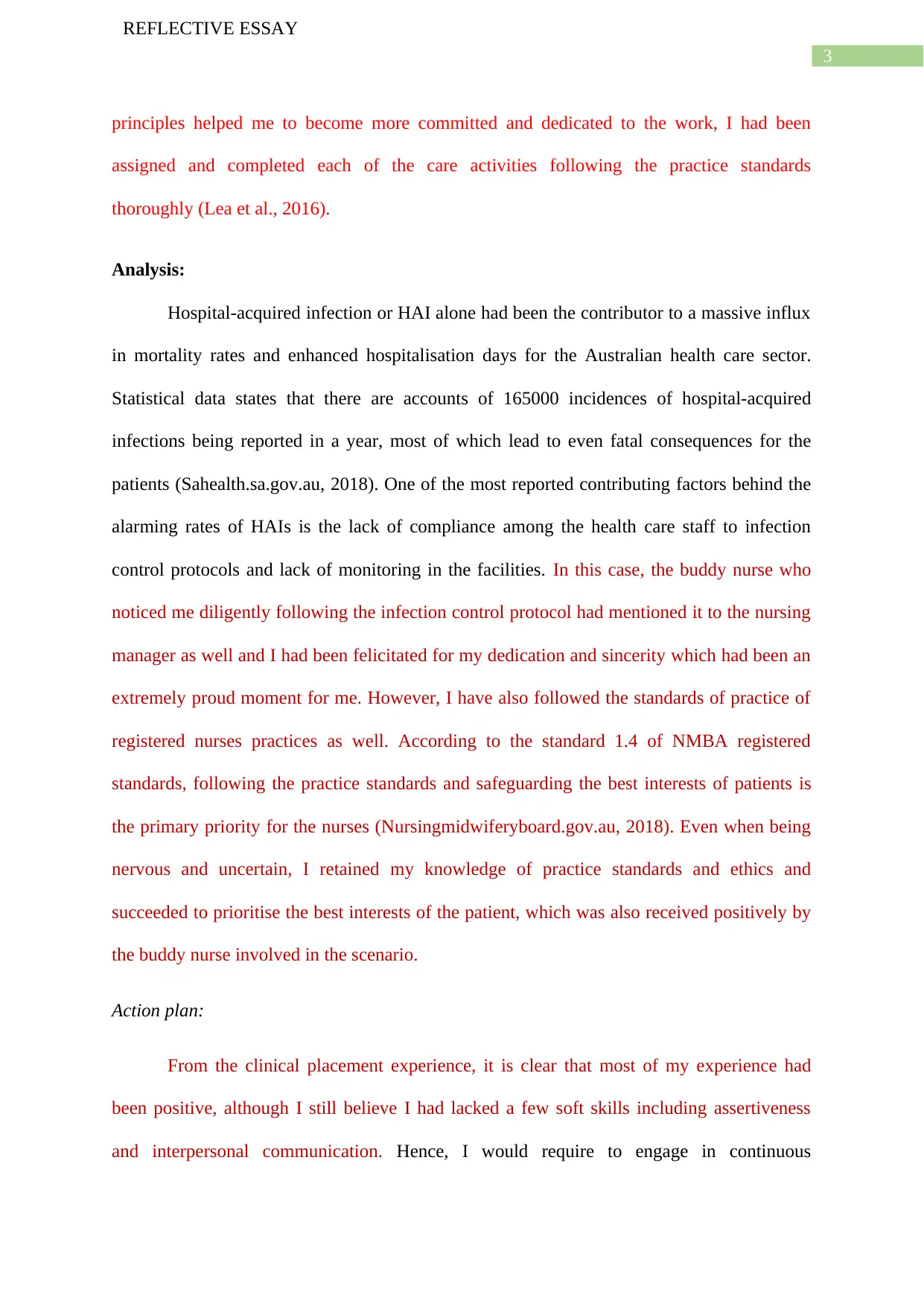
3
REFLECTIVE ESSAY
principles helped me to become more committed and dedicated to the work, I had been
assigned and completed each of the care activities following the practice standards
thoroughly (Lea et al., 2016).
Analysis:
Hospital-acquired infection or HAI alone had been the contributor to a massive influx
in mortality rates and enhanced hospitalisation days for the Australian health care sector.
Statistical data states that there are accounts of 165000 incidences of hospital-acquired
infections being reported in a year, most of which lead to even fatal consequences for the
patients (Sahealth.sa.gov.au, 2018). One of the most reported contributing factors behind the
alarming rates of HAIs is the lack of compliance among the health care staff to infection
control protocols and lack of monitoring in the facilities. In this case, the buddy nurse who
noticed me diligently following the infection control protocol had mentioned it to the nursing
manager as well and I had been felicitated for my dedication and sincerity which had been an
extremely proud moment for me. However, I have also followed the standards of practice of
registered nurses practices as well. According to the standard 1.4 of NMBA registered
standards, following the practice standards and safeguarding the best interests of patients is
the primary priority for the nurses (Nursingmidwiferyboard.gov.au, 2018). Even when being
nervous and uncertain, I retained my knowledge of practice standards and ethics and
succeeded to prioritise the best interests of the patient, which was also received positively by
the buddy nurse involved in the scenario.
Action plan:
From the clinical placement experience, it is clear that most of my experience had
been positive, although I still believe I had lacked a few soft skills including assertiveness
and interpersonal communication. Hence, I would require to engage in continuous
REFLECTIVE ESSAY
principles helped me to become more committed and dedicated to the work, I had been
assigned and completed each of the care activities following the practice standards
thoroughly (Lea et al., 2016).
Analysis:
Hospital-acquired infection or HAI alone had been the contributor to a massive influx
in mortality rates and enhanced hospitalisation days for the Australian health care sector.
Statistical data states that there are accounts of 165000 incidences of hospital-acquired
infections being reported in a year, most of which lead to even fatal consequences for the
patients (Sahealth.sa.gov.au, 2018). One of the most reported contributing factors behind the
alarming rates of HAIs is the lack of compliance among the health care staff to infection
control protocols and lack of monitoring in the facilities. In this case, the buddy nurse who
noticed me diligently following the infection control protocol had mentioned it to the nursing
manager as well and I had been felicitated for my dedication and sincerity which had been an
extremely proud moment for me. However, I have also followed the standards of practice of
registered nurses practices as well. According to the standard 1.4 of NMBA registered
standards, following the practice standards and safeguarding the best interests of patients is
the primary priority for the nurses (Nursingmidwiferyboard.gov.au, 2018). Even when being
nervous and uncertain, I retained my knowledge of practice standards and ethics and
succeeded to prioritise the best interests of the patient, which was also received positively by
the buddy nurse involved in the scenario.
Action plan:
From the clinical placement experience, it is clear that most of my experience had
been positive, although I still believe I had lacked a few soft skills including assertiveness
and interpersonal communication. Hence, I would require to engage in continuous
Secure Best Marks with AI Grader
Need help grading? Try our AI Grader for instant feedback on your assignments.
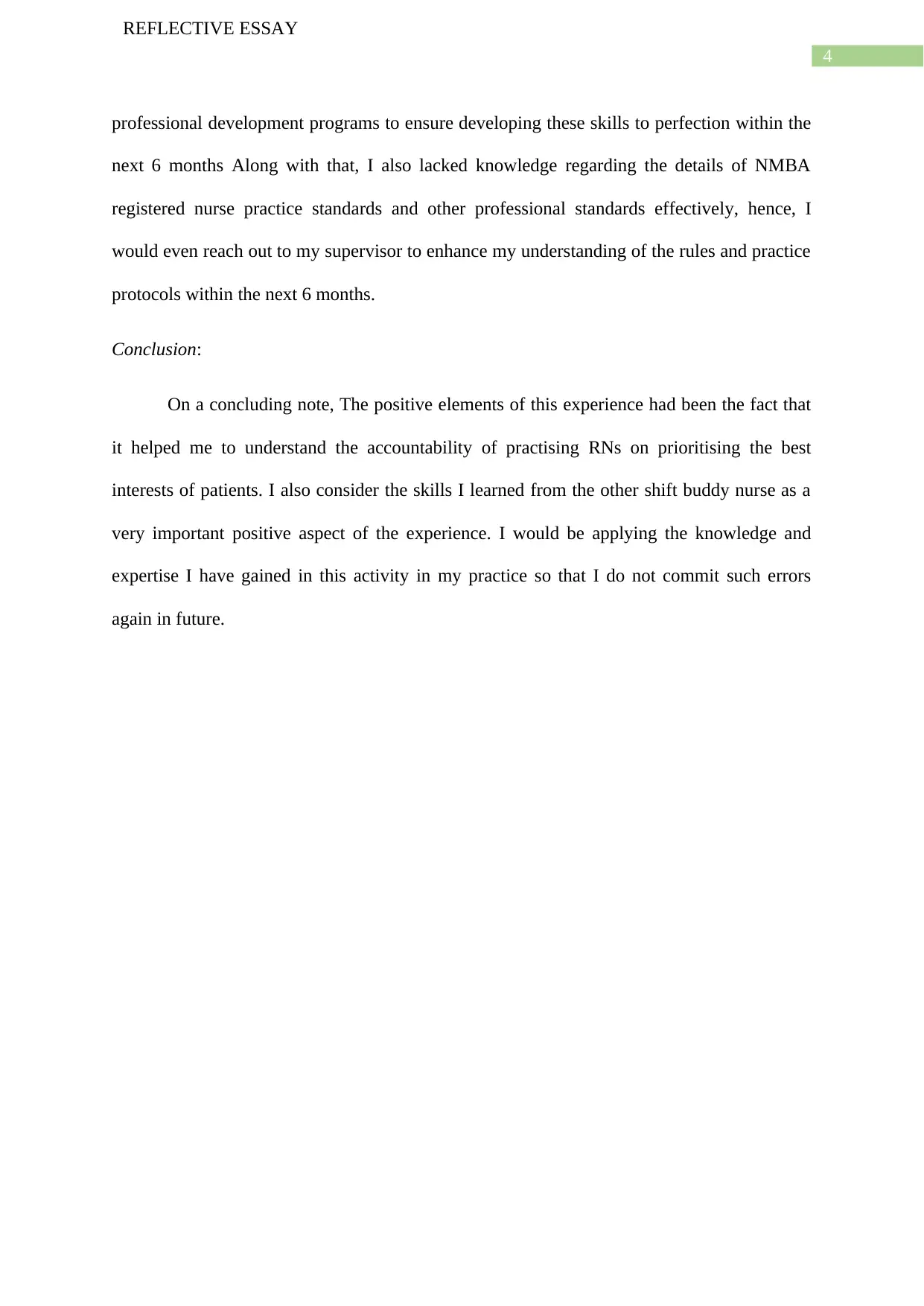
4
REFLECTIVE ESSAY
professional development programs to ensure developing these skills to perfection within the
next 6 months Along with that, I also lacked knowledge regarding the details of NMBA
registered nurse practice standards and other professional standards effectively, hence, I
would even reach out to my supervisor to enhance my understanding of the rules and practice
protocols within the next 6 months.
Conclusion:
On a concluding note, The positive elements of this experience had been the fact that
it helped me to understand the accountability of practising RNs on prioritising the best
interests of patients. I also consider the skills I learned from the other shift buddy nurse as a
very important positive aspect of the experience. I would be applying the knowledge and
expertise I have gained in this activity in my practice so that I do not commit such errors
again in future.
REFLECTIVE ESSAY
professional development programs to ensure developing these skills to perfection within the
next 6 months Along with that, I also lacked knowledge regarding the details of NMBA
registered nurse practice standards and other professional standards effectively, hence, I
would even reach out to my supervisor to enhance my understanding of the rules and practice
protocols within the next 6 months.
Conclusion:
On a concluding note, The positive elements of this experience had been the fact that
it helped me to understand the accountability of practising RNs on prioritising the best
interests of patients. I also consider the skills I learned from the other shift buddy nurse as a
very important positive aspect of the experience. I would be applying the knowledge and
expertise I have gained in this activity in my practice so that I do not commit such errors
again in future.
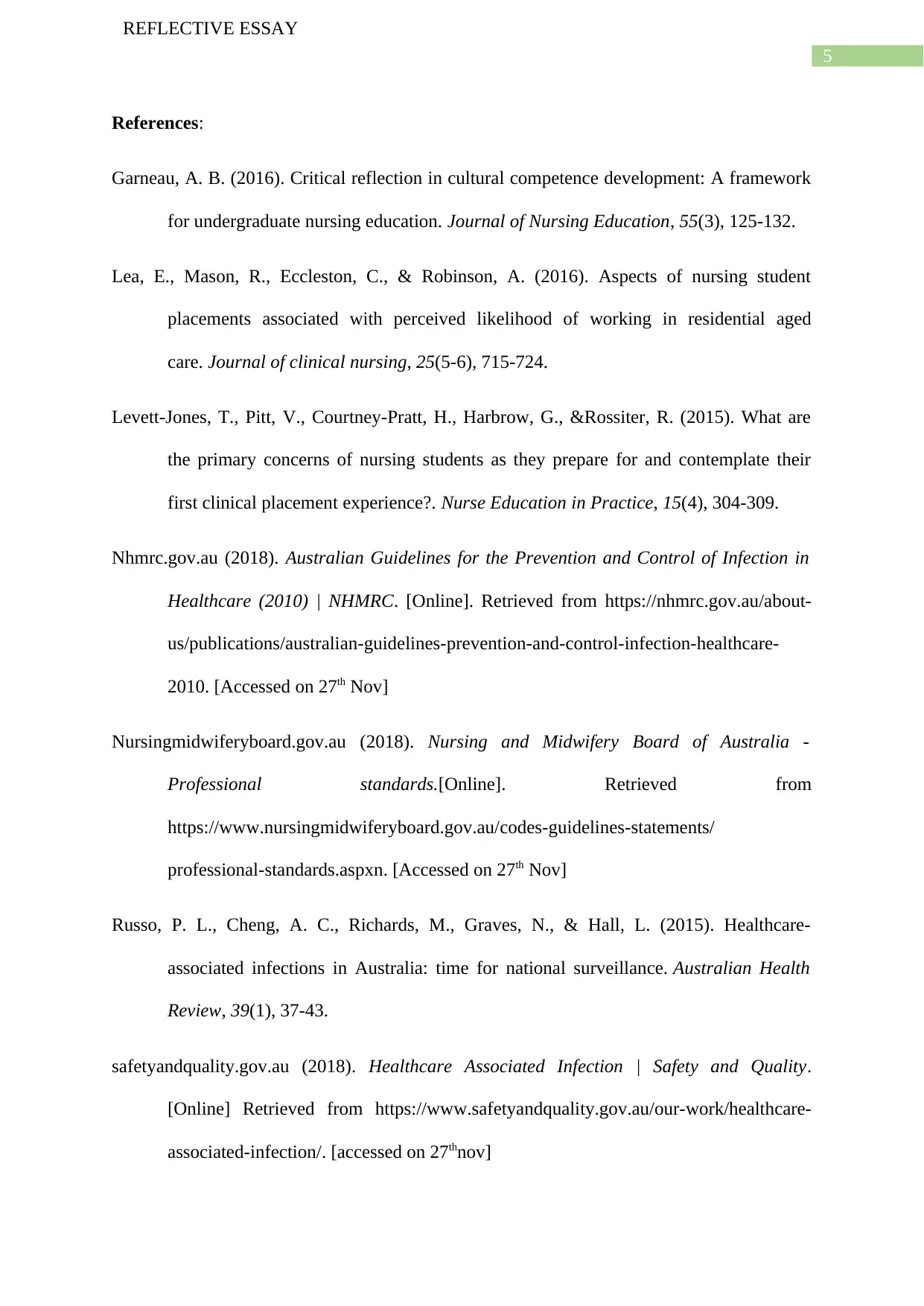
5
REFLECTIVE ESSAY
References:
Garneau, A. B. (2016). Critical reflection in cultural competence development: A framework
for undergraduate nursing education. Journal of Nursing Education, 55(3), 125-132.
Lea, E., Mason, R., Eccleston, C., & Robinson, A. (2016). Aspects of nursing student
placements associated with perceived likelihood of working in residential aged
care. Journal of clinical nursing, 25(5-6), 715-724.
Levett-Jones, T., Pitt, V., Courtney-Pratt, H., Harbrow, G., &Rossiter, R. (2015). What are
the primary concerns of nursing students as they prepare for and contemplate their
first clinical placement experience?. Nurse Education in Practice, 15(4), 304-309.
Nhmrc.gov.au (2018). Australian Guidelines for the Prevention and Control of Infection in
Healthcare (2010) | NHMRC. [Online]. Retrieved from https://nhmrc.gov.au/about-
us/publications/australian-guidelines-prevention-and-control-infection-healthcare-
2010. [Accessed on 27th Nov]
Nursingmidwiferyboard.gov.au (2018). Nursing and Midwifery Board of Australia -
Professional standards.[Online]. Retrieved from
https://www.nursingmidwiferyboard.gov.au/codes-guidelines-statements/
professional-standards.aspxn. [Accessed on 27th Nov]
Russo, P. L., Cheng, A. C., Richards, M., Graves, N., & Hall, L. (2015). Healthcare-
associated infections in Australia: time for national surveillance. Australian Health
Review, 39(1), 37-43.
safetyandquality.gov.au (2018). Healthcare Associated Infection | Safety and Quality.
[Online] Retrieved from https://www.safetyandquality.gov.au/our-work/healthcare-
associated-infection/. [accessed on 27thnov]
REFLECTIVE ESSAY
References:
Garneau, A. B. (2016). Critical reflection in cultural competence development: A framework
for undergraduate nursing education. Journal of Nursing Education, 55(3), 125-132.
Lea, E., Mason, R., Eccleston, C., & Robinson, A. (2016). Aspects of nursing student
placements associated with perceived likelihood of working in residential aged
care. Journal of clinical nursing, 25(5-6), 715-724.
Levett-Jones, T., Pitt, V., Courtney-Pratt, H., Harbrow, G., &Rossiter, R. (2015). What are
the primary concerns of nursing students as they prepare for and contemplate their
first clinical placement experience?. Nurse Education in Practice, 15(4), 304-309.
Nhmrc.gov.au (2018). Australian Guidelines for the Prevention and Control of Infection in
Healthcare (2010) | NHMRC. [Online]. Retrieved from https://nhmrc.gov.au/about-
us/publications/australian-guidelines-prevention-and-control-infection-healthcare-
2010. [Accessed on 27th Nov]
Nursingmidwiferyboard.gov.au (2018). Nursing and Midwifery Board of Australia -
Professional standards.[Online]. Retrieved from
https://www.nursingmidwiferyboard.gov.au/codes-guidelines-statements/
professional-standards.aspxn. [Accessed on 27th Nov]
Russo, P. L., Cheng, A. C., Richards, M., Graves, N., & Hall, L. (2015). Healthcare-
associated infections in Australia: time for national surveillance. Australian Health
Review, 39(1), 37-43.
safetyandquality.gov.au (2018). Healthcare Associated Infection | Safety and Quality.
[Online] Retrieved from https://www.safetyandquality.gov.au/our-work/healthcare-
associated-infection/. [accessed on 27thnov]
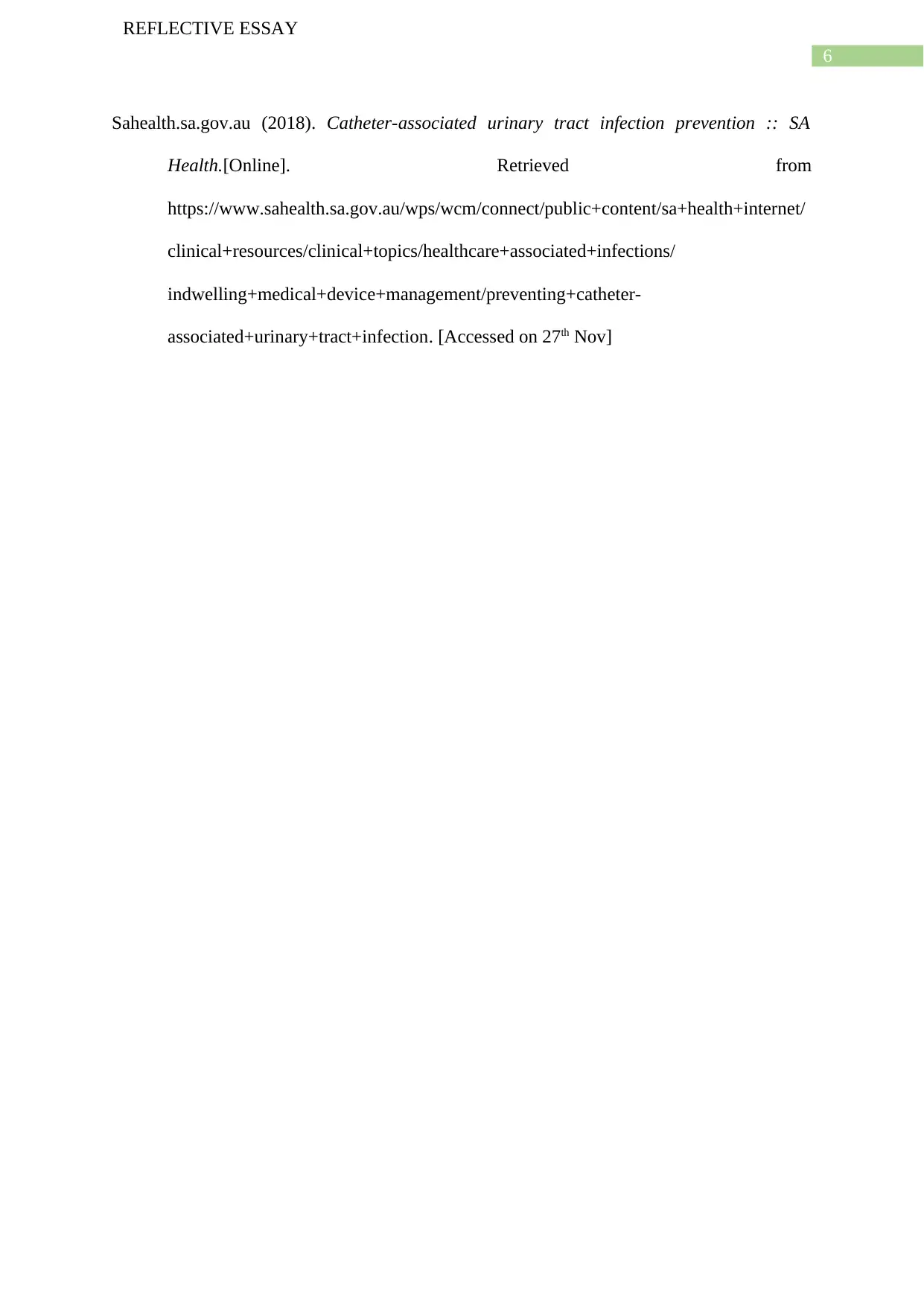
6
REFLECTIVE ESSAY
Sahealth.sa.gov.au (2018). Catheter-associated urinary tract infection prevention :: SA
Health.[Online]. Retrieved from
https://www.sahealth.sa.gov.au/wps/wcm/connect/public+content/sa+health+internet/
clinical+resources/clinical+topics/healthcare+associated+infections/
indwelling+medical+device+management/preventing+catheter-
associated+urinary+tract+infection. [Accessed on 27th Nov]
REFLECTIVE ESSAY
Sahealth.sa.gov.au (2018). Catheter-associated urinary tract infection prevention :: SA
Health.[Online]. Retrieved from
https://www.sahealth.sa.gov.au/wps/wcm/connect/public+content/sa+health+internet/
clinical+resources/clinical+topics/healthcare+associated+infections/
indwelling+medical+device+management/preventing+catheter-
associated+urinary+tract+infection. [Accessed on 27th Nov]
Paraphrase This Document
Need a fresh take? Get an instant paraphrase of this document with our AI Paraphraser
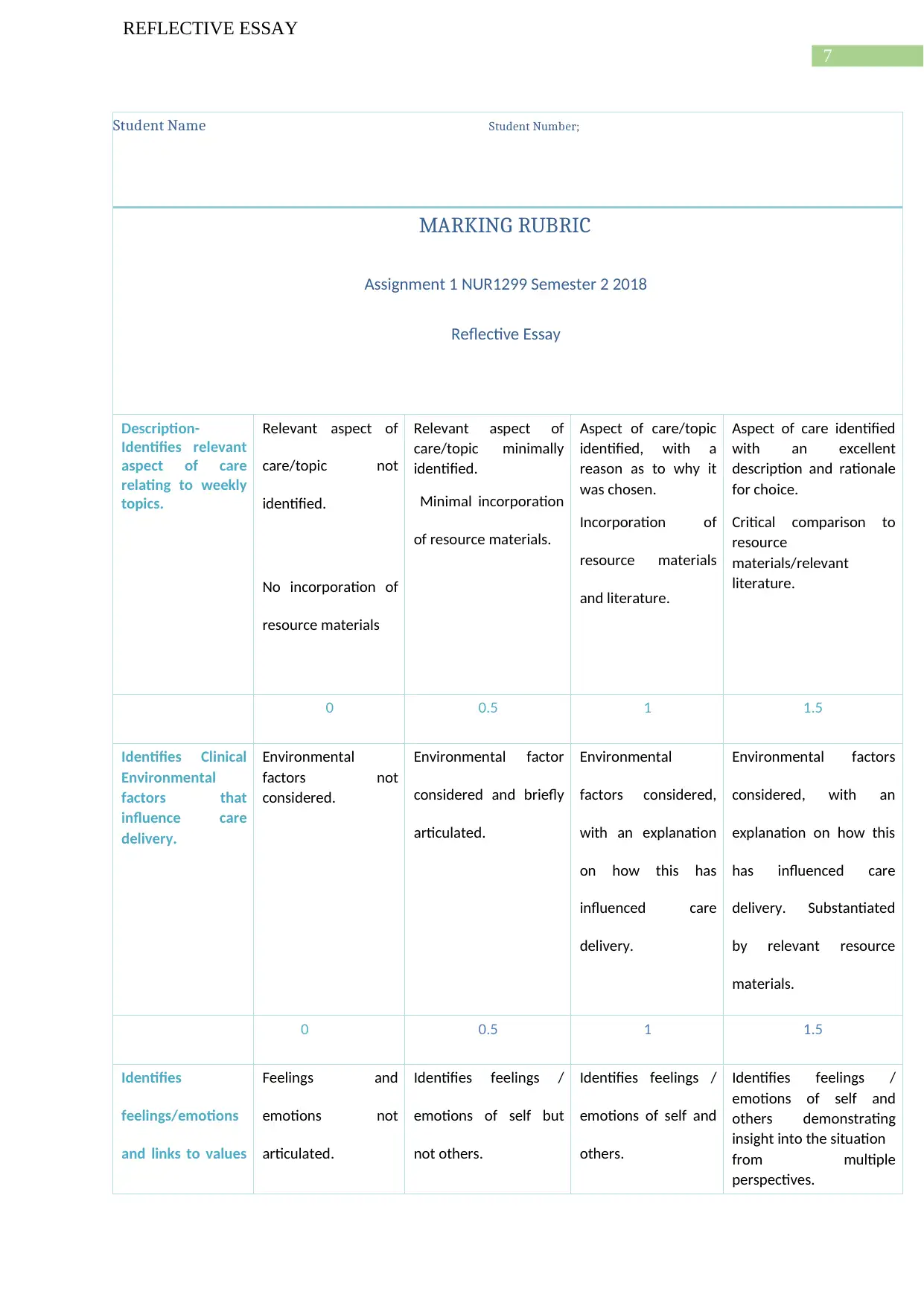
7
REFLECTIVE ESSAY
Student Name Student Number;
MARKING RUBRIC
Assignment 1 NUR1299 Semester 2 2018
Reflective Essay
Description-
Identifies relevant
aspect of care
relating to weekly
topics.
Relevant aspect of
care/topic not
identified.
No incorporation of
resource materials
Relevant aspect of
care/topic minimally
identified.
Minimal incorporation
of resource materials.
Aspect of care/topic
identified, with a
reason as to why it
was chosen.
Incorporation of
resource materials
and literature.
Aspect of care identified
with an excellent
description and rationale
for choice.
Critical comparison to
resource
materials/relevant
literature.
0 0.5 1 1.5
Identifies Clinical
Environmental
factors that
influence care
delivery.
Environmental
factors not
considered.
Environmental factor
considered and briefly
articulated.
Environmental
factors considered,
with an explanation
on how this has
influenced care
delivery.
Environmental factors
considered, with an
explanation on how this
has influenced care
delivery. Substantiated
by relevant resource
materials.
0 0.5 1 1.5
Identifies
feelings/emotions
and links to values
Feelings and
emotions not
articulated.
Identifies feelings /
emotions of self but
not others.
Identifies feelings /
emotions of self and
others.
Identifies feelings /
emotions of self and
others demonstrating
insight into the situation
from multiple
perspectives.
REFLECTIVE ESSAY
Student Name Student Number;
MARKING RUBRIC
Assignment 1 NUR1299 Semester 2 2018
Reflective Essay
Description-
Identifies relevant
aspect of care
relating to weekly
topics.
Relevant aspect of
care/topic not
identified.
No incorporation of
resource materials
Relevant aspect of
care/topic minimally
identified.
Minimal incorporation
of resource materials.
Aspect of care/topic
identified, with a
reason as to why it
was chosen.
Incorporation of
resource materials
and literature.
Aspect of care identified
with an excellent
description and rationale
for choice.
Critical comparison to
resource
materials/relevant
literature.
0 0.5 1 1.5
Identifies Clinical
Environmental
factors that
influence care
delivery.
Environmental
factors not
considered.
Environmental factor
considered and briefly
articulated.
Environmental
factors considered,
with an explanation
on how this has
influenced care
delivery.
Environmental factors
considered, with an
explanation on how this
has influenced care
delivery. Substantiated
by relevant resource
materials.
0 0.5 1 1.5
Identifies
feelings/emotions
and links to values
Feelings and
emotions not
articulated.
Identifies feelings /
emotions of self but
not others.
Identifies feelings /
emotions of self and
others.
Identifies feelings /
emotions of self and
others demonstrating
insight into the situation
from multiple
perspectives.
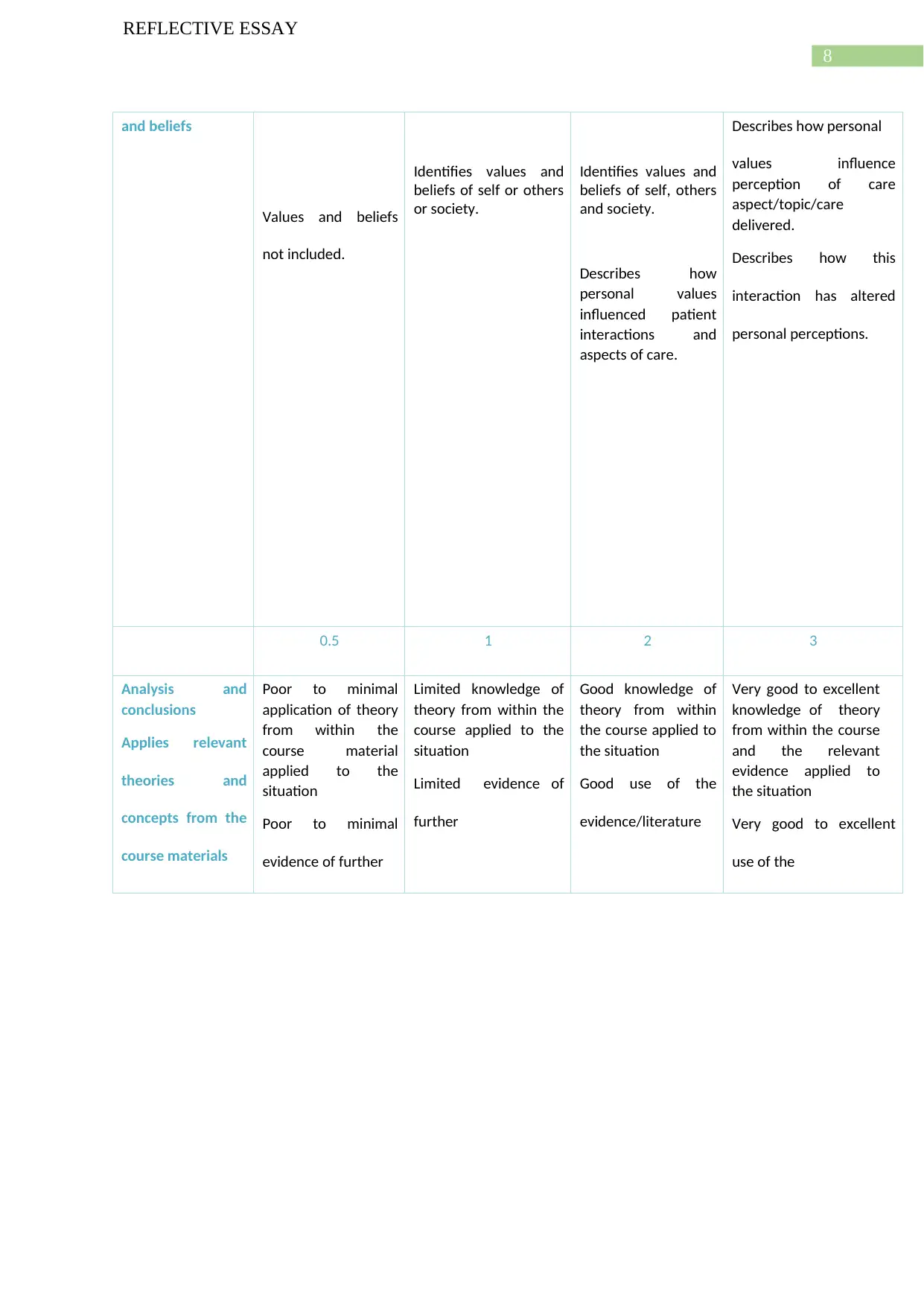
8
REFLECTIVE ESSAY
and beliefs
Values and beliefs
not included.
Identifies values and
beliefs of self or others
or society.
Identifies values and
beliefs of self, others
and society.
Describes how
personal values
influenced patient
interactions and
aspects of care.
Describes how personal
values influence
perception of care
aspect/topic/care
delivered.
Describes how this
interaction has altered
personal perceptions.
0.5 1 2 3
Analysis and
conclusions
Applies relevant
theories and
concepts from the
course materials
Poor to minimal
application of theory
from within the
course material
applied to the
situation
Poor to minimal
evidence of further
Limited knowledge of
theory from within the
course applied to the
situation
Limited evidence of
further
Good knowledge of
theory from within
the course applied to
the situation
Good use of the
evidence/literature
Very good to excellent
knowledge of theory
from within the course
and the relevant
evidence applied to
the situation
Very good to excellent
use of the
REFLECTIVE ESSAY
and beliefs
Values and beliefs
not included.
Identifies values and
beliefs of self or others
or society.
Identifies values and
beliefs of self, others
and society.
Describes how
personal values
influenced patient
interactions and
aspects of care.
Describes how personal
values influence
perception of care
aspect/topic/care
delivered.
Describes how this
interaction has altered
personal perceptions.
0.5 1 2 3
Analysis and
conclusions
Applies relevant
theories and
concepts from the
course materials
Poor to minimal
application of theory
from within the
course material
applied to the
situation
Poor to minimal
evidence of further
Limited knowledge of
theory from within the
course applied to the
situation
Limited evidence of
further
Good knowledge of
theory from within
the course applied to
the situation
Good use of the
evidence/literature
Very good to excellent
knowledge of theory
from within the course
and the relevant
evidence applied to
the situation
Very good to excellent
use of the
1 out of 9
Related Documents
Your All-in-One AI-Powered Toolkit for Academic Success.
+13062052269
info@desklib.com
Available 24*7 on WhatsApp / Email
![[object Object]](/_next/static/media/star-bottom.7253800d.svg)
Unlock your academic potential
© 2024 | Zucol Services PVT LTD | All rights reserved.




